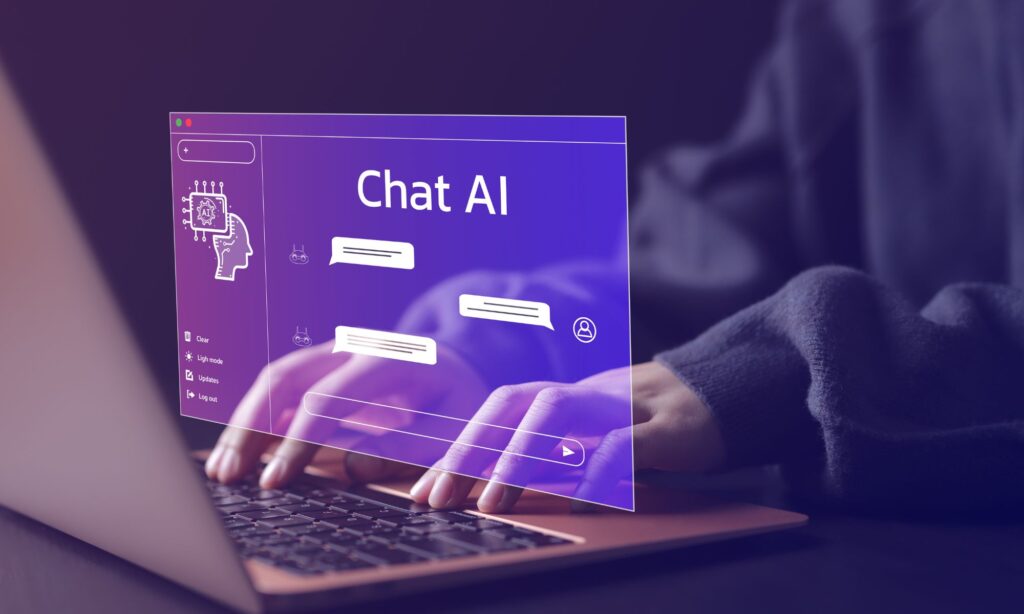Firstly, let’s briefly touch on what artificial intelligence (AI) is exactly. After all, there is no doubt it will impact your everyday life, and that includes your work life too. Whether you’re actively searching for candidates to support amidst the ongoing AI revolution, or interested in apprenticeships, artificial intelligence is pervading all aspects of life more and more frequently.
You may sometimes hear artificial intelligence referred to as ‘AI’. In summary, it refers to the simulation of human intelligence processes by machines, and can assist with tasks such as learning, reasoning, and problem solving.
AI is a field that is rapidly developing and driving innovation across all industries, revolutionising how we interact with technology and perceive the world around us. In this blog, we’ll explore both the negative and positive implications of AI. Particularly when it comes to the job market and apprenticeships.
![]()
What jobs will be impacted by AI?
There are already many jobs that use AI to allow certain roles to be executed more efficiently. And it’s no wonder businesses are leveraging AI tools, with one Forbes Advisor survey stating that 53% of businesses apply AI to improve production processes.
In 2024, these are just some of the industries that are using AI and, interestingly, how they’re using them:
- Marketing: AI research giant, OpenAI, launched software ‘ChatGPT’ in November 2022. Ever since, it has significantly transformed the marketing landscape and is supporting marketeers around the world to research, create content, and brainstorm in a matter of seconds.
- Travel: With fewer brick-and-mortar travel agencies due to the rising demand of online booking, AI is already shaping the way travellers plan their trips. Businesses such as Wonderplan and Layla (Roam Around) claim to quickly serve up travel recommendations and create personalised itineraries. Cool, right?
- Healthcare: What’s more important than living a healthy life? We’re fortunate that in today’s fast technology-progressing age AI is pivotal in helping the population to live longer, with a better quality of life. AI is currently being used to benefit people in health and care by analysing X-ray images, such as mammograms, to support radiologists in conducting assessments. This allows radiologists to spend more time with patients, or to screen greater numbers of people more quickly.
- Finance: From fraud detection to chatbot assistants, the finance industry is no stranger to AI. Zest AI is an example of an underwriting tool that is being used to help businesses assess borrowers with a lack of credit history. As a banking customer, you’ll be pleased to also hear that many banks and building societies now offer chatbots that can answer some of your questions pretty much instantly… cheers to less of the long waits on the phone!
- Hospitality: Another industry benefiting from the power of AI is hospitality. Hotels for instance are using AI to improve processes by implementing things like contactless check-in, inventory management, and more. Not only does this benefit hospitality organisations from an operational perspective, it also enhances customer satisfaction.
![]()
How will apprenticeships be affected by AI?

As well as the traditional job market, AI also has an impact on other forms of learning and employment, such as apprenticeships.
One major way apprenticeships are being affected by AI is through the evolving nature of job roles. As AI automates routine tasks, employer requirements for certain skills may decline while the need for new, tech-focused competencies will likely rise. This shift will undoubtedly result in a reassessment of apprenticeship programs to ensure they remain aligned with emerging job requirements. For instance, apprenticeships in data analysis, cybersecurity, or software development could grow in popularity as many industries increasingly rely on AI technologies.
As you might be aware, apprenticeships involve ‘off the job learning’. This refers to the time that must be spent in either a ‘classroom environment’ or an opportunity that is away from your normal role, where you can build key skills relating to your chosen apprenticeship standard. It’s expected that AI will impact the learning experience associated with apprenticeships, with intelligent tutoring systems and virtual reality (VR) likely to elevate the learner experience. For example, VR can introduce realistic simulations that allow apprentices to carry out tasks and gain experience like they would in the real world.
![]()
What is the negative impact of artificial intelligence on jobs?
There is plenty of praise around AI, however there have also been many concerns regarding the uncertainty of traditional apprenticeship roles due to automation.
As AI takes over repetitive tasks, apprenticeships in sectors like manufacturing or administration may undergo restructuring or decline. This could mean a focus on reskilling initiatives are required to adapt to changing job markets.
Other criticisms of AI’s impact on job roles include security risks from hacking, data privacy, a lack of creativity and human-like empathy. You may have noticed that some AI tools can produce content that sounds, erm, well, rather robotic…
![]()
What about the positive impact of artificial intelligence on jobs?
Do the positives outweigh the negatives when it comes to AI? Well, when it comes to its impact on the workforce, it’s fair to say that there is evidence out there to support both sides of the argument. Whether you’re pro AI or against it, there’s no denying it is and will continue to transform the way we work.
Improved decision making (thanks to complex data being better analysed), risk reduction and increased efficiency are a few of the reasons why workers are feeling positive towards AI. Others applaud AI for its ability to reduce workplace stress and burnout. Employees are able to spend time on more fulfilling and meaningful tasks, which typically leads to higher job satisfaction, and improved overall wellbeing at work.
![]()
Hire an apprentice to help your company adapt to AI

Digital apprenticeships are increasing in demand due to AI. Whilst they may automate some of the more monotonous tasks, it’s hard to automate originality and creativity… disciplines such as marketing often involve connecting with your customers on an emotional level, something which humans only have.
Apprentices are often young professionals in the early stages of their careers. With many being digital natives, most are already well-versed with AI tools. By hiring a digital apprentice, you can stay ahead of your competition and ensure your organisation takes a proactive approach to the AI revolution.
Here at Access Industry, we live and breathe all things digital and creative apprenticeship related! We offer apprenticeships such as Level 3 Multichannel Marketer, Level 3 Content Creator, Level 3 Software Development Technician, Level 4 Software Developer, and more.
Contact us to discuss digital apprenticeships.
- Apprentice Hiring Checklist: A Guide to What You Need to Consider - December 20, 2024
- What are the different levels of apprenticeships: An employer’s guide - November 26, 2024
- How does off-the-job training work for apprenticeships - November 22, 2024